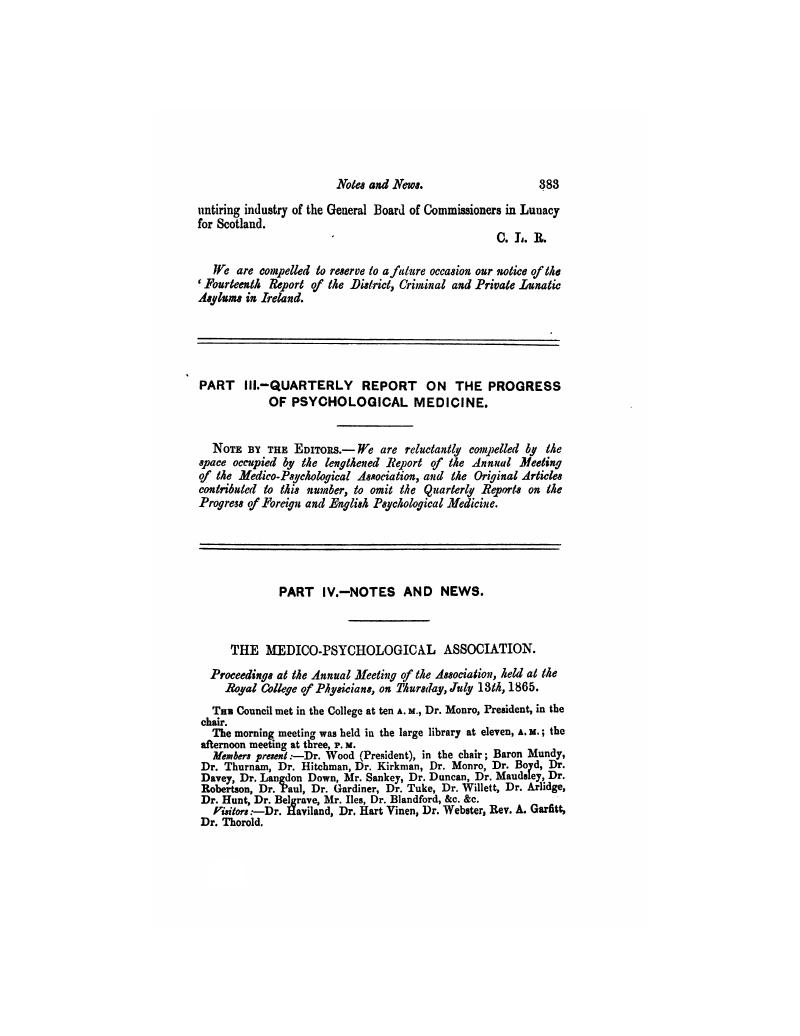Published online by Cambridge University Press: 19 February 2018

∗ Superanuation Arrangements.—Dr. Kirkman proposed—“That a committee be appointed from this Association, with the definite object of obtaining a reversal of the latter portion of the 12th section of the Lunatic Asglums Amendment Act, and to press for legislative sanction to satisfactory superannuation arrangements.” The section of the Act to which he, referred was as follows :— " Provided that no annuity by way of superannuation, granted by the visitors of any asylum under the provisions of this Act, or of the Lunacy Act chapter 97, shall be chargeable on or payable out of the rates of any county, until such annuity shall have been confirmed by a resolution of the justices of such county in general or quarter sessions assembled”. The concluding proviso he regarded as most cruel, negativing the use of the clause altogether. Speaking personally, having been connected with public asylums for thirty years, he could not well be refused a pension, but to secure it it would necessary that the subject should be discussed at four sessional meetings. He had no doubt that he could command the undivided interest of the whole of his house committee; but objectionable remarks and slurs might be thrown out at the sessional meetings, which would be extremely painful. Any one fitted to be an asylum officer must necessarily possess a sensitive mind and the harsh remarks occasionally made in magisterial sessions would be likely to wound his feelings. He thought the enactment ought to be compulsory, and the objectionable clause removed. At the present time a beloved member of the Association was suffering from physical injury received in the discharge of his duty, and it would be a most unfair thing if a gentleman in his position were subjected to unpleasant remarks about his superannuation allowance.Google Scholar
Dr. Robertson seconded the resolution, and said that, as the section originally stood, the question of superannuation was left to the visitors; but a very active member of the House of Commons succeeded in committee in getting the objectionable rider added, which literally made the preceding portion worthless. Thus, he had no doubt that any reasonable reward for his services in Sussex would be gladly given by the committee of visitors, but he should exceedingly object to be made the subject of discussion at sessional meeting in the two divisions of the county. He had known the most trifling matter, involving the expenditure of £50, made the subject of lengthened discussion there; and if a proposal were made to allow a medical superintendent three or four hundred a year, most painful remarks to the feelings of a gentleman would be made as to his physique, his general statie of health, whether more work could not be ground out of him, and the like. jfe had no doubt that great benefit would be derived by the appointment of a small committee to consider the question carefully, and communicate with the Commissioners and with some members of the House of Commons on the subject.Google Scholar
The following members were appointed:—Dr. Kirkman, Dr. Sheppard, Br. Robertson, and Dr. Maudsley.—(Annual Meeting of the Association, 1864.)Google Scholar
eLetters
No eLetters have been published for this article.